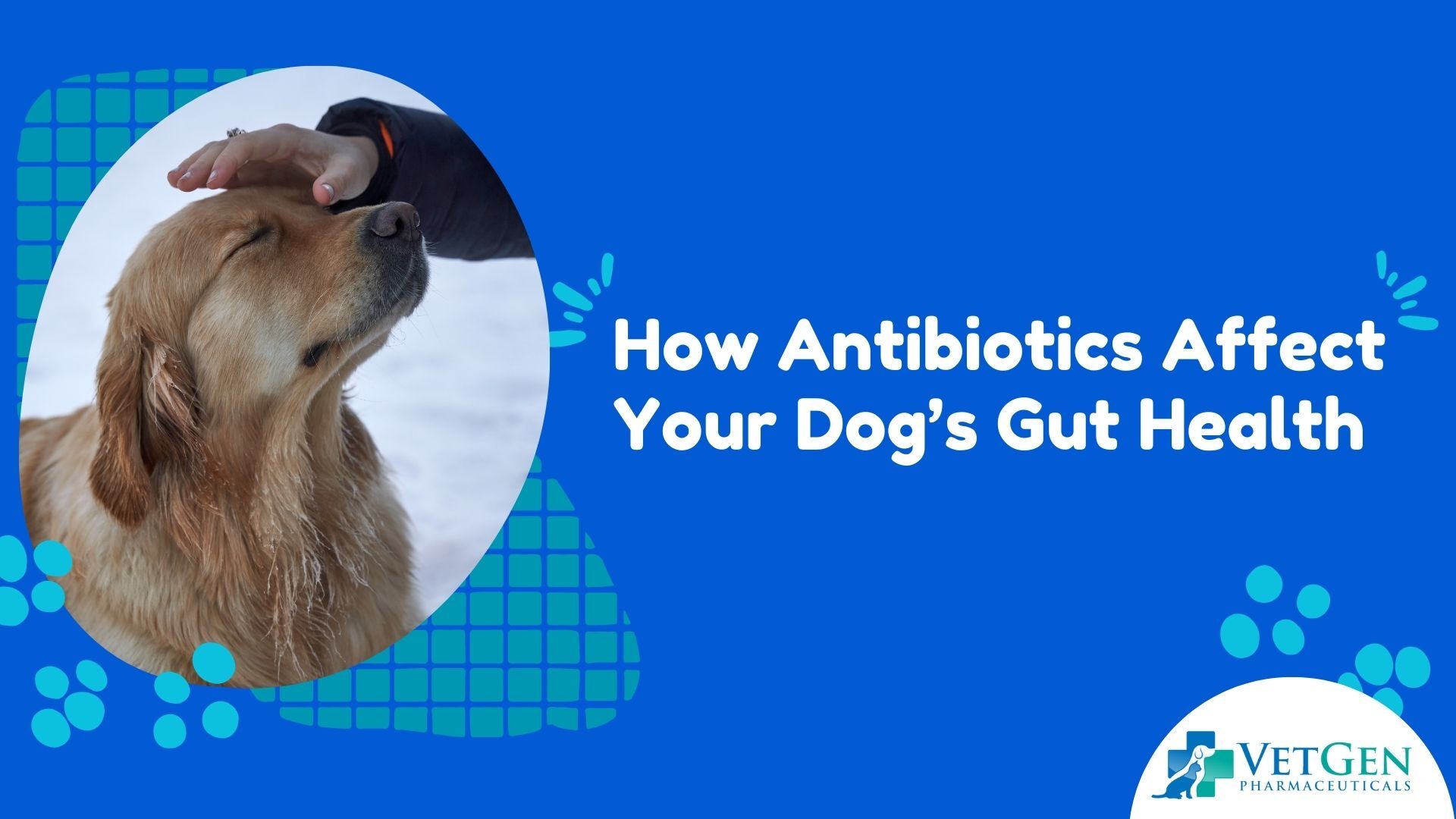Antibiotics are drugs used effectively to treat the infection caused by bacteria in the body of the dog. Although these drugs are effective in eradicating pathogenic microorganisms, they also target the beneficial bacteria in the gastrointestinal tract of your dog, thus disrupting the microbiome.
Knowing how these medicines impact the digestive system and gut flora of your pet will help you make the right choices and ensure a successful outcome in the post-treatment period.
This blog focuses on the impact of antibiotics on your dog’s gut health, citing proper research and other relevant information.
1. Impact on Gut Microbiome
The gut microbiome consists of bacteria, fungi, and viruses residing in the gastrointestinal tracts of human beings and other animals. They are involved in the dog digestion process, absorption of nutrients and vitamins, the immune system and other aspects of behavior. The good bacteria that help with digestion and absorption
A study found that in dogs, even a short-term antibiotic course can dramatically alter bacterial composition in the gut for as long as six months or even longer. This decrease in bacterial count and the variety of bacteria affects the function of the gut in terms of protection from infections, digestion, and nutrient assimilation.
2. Risk of Dysbiosis
Antibiotics can cause dysbiosis or an imbalance of good and bad bacteria in the gut when the bacteria balance is interfered with. Dysbiosis is a condition where the population of pathogenic bacteria increases at the expense of healthy ones and results in gastrointestinal conditions like diarrhea, bloating, and vomiting.
In the study, it was revealed that antibiotic usage in dogs resulted in increased cases of dysbiosis, and symptoms were manifest for extended periods even after treatment with the antibiotic.
Possible symptoms of dysbiosis in dogs include diarrhea, bloating and the appearance of slight changes in appetite. If not managed, this creates an imbalance within the body, which, if it persists over a long time, can lead to a compromised immune system and susceptibility to other infections.
3. Impact on Digestive Function
Digestive issues in dogs, such as the loss of beneficial bacteria, can also create problems with the digestion or absorption of nutrients. Gut bacteria assist in the digestion and absorption of carbohydrates, proteins, and fats. When these bacteria are killed, your dog becomes less efficient in digesting food, leading to food deficiency and weight loss.
Moreover, antibiotics can cause a temporary decrease in the production of certain digestive enzymes, further slowing down digestion. This is why dogs on antibiotics often experience gastrointestinal discomfort and irregular bowel movements.
4. Increased Susceptibility to Infections
A healthy gut microbiome acts as a barrier against harmful pathogens. Antibiotics, by depleting the good bacteria, can leave your dog’s digestive system more vulnerable to infections, particularly from opportunistic pathogens like Clostridium difficile or Salmonella. These pathogens can take advantage of the weakened gut environment to cause severe gastrointestinal issues.
5. Prolonged Recovery After Antibiotics
Although there are times when antibiotics are required to treat infections, they also affect the gut, causing a slow rate of healing. Any dog that has had digestive problems, nutrient intolerance, or secondary bacterial infections after antibiotics needs more time to recover its energy levels and digestive system. Sometimes, a dog might need other forms of supplementation, like probiotics or prebiotics, to balance the gut.
A study found that feeding the probiotics during and after antibiotic therapy considerably decreased the duration of diarrhea and gastrointestinal disturbance in dogs. Their benefits include the ability to replace the good bacteria in the gut and correct the imbalance
6. Potential for Antibiotic Resistance
Another concern that has been emerging over the years with the application of antibiotics in humans and animals is the formation of antibiotic-resistant bacteria. When antibiotics are used frequently or improperly, certain kinds of bacteria can change and hence become invulnerable to medication.
This does not only help future infections become difficult to control but also can have an effect on the overall health of your dog’s gut.
The Centers for Disease Control and Prevention (CDC) warns that antibiotic resistance is a significant public health issue. Pet owners should avoid overusing antibiotics with their dogs. Avoid the use of antibiotics and always follow your veterinarian’s recommendations to prevent antibiotic resistance.
7. Long-Term Gut Health Maintenance
Once a course of antibiotics has been taken, it is important to think about the ways of maintaining gut health in the long run. This includes feeding the patient’s a balanced diet with fiber, use of probiotics or fermented foods and refraining from unnecessary use of drugs that would worsen the gut.
According to the study done by the American Animal Hospital Association (AAHA), the good and diverse bacteria in your canine’s stomach are vital for their health.
Some pet owners may also use supplemental nutrients, like digestive enzymes, probiotics and omega-3 fatty acids that help to maintain a healthy gut and reduce inflammation.
Conclusion
While antibiotics are crucial in treating infections, their impact on your dog’s gut health should not be overlooked. Antibiotics can disrupt the balance of good and bad bacteria, leading to digestive issues, weakened immunity, and long-term gut health challenges. Understanding these effects and taking steps to restore gut balance—such as incorporating probiotics and prebiotics—can help your dog recover faster and maintain optimal health.
Frequently Asked Questions
Can antibiotics cause permanent damage to my dog’s gut?
While antibiotics can significantly impact gut health, in most cases, the gut microbiome will recover with time and proper care. Administering probiotics and a balanced diet can speed up recovery and minimize long-term effects.
Should I give my dog probiotics while on antibiotics?
Yes, many veterinarians recommend giving probiotics during and after antibiotic treatment to replenish good bacteria and reduce the risk of dysbiosis. Consult your vet for the best probiotic options for your dog.
How long does it take for my dog’s gut to recover after antibiotics?
Recovery times vary depending on the length of antibiotic treatment and the individual dog, but it can take several weeks to months for the gut microbiome to fully recover.






